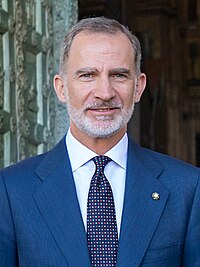
Back الملكية في إسبانيا Arabic Monarkiya kan Espanya BCL Španělská monarchie Czech Spanische Monarchie German Μοναρχία της Ισπανίας Greek Monarkio de Hispanio Esperanto Monarquía Española Spanish Hispaania kuningas Estonian پادشاهی اسپانیا Persian Espanjan hallitsija Finnish
| King of Spain | |
|---|---|
| Spanish: Rey de España | |
 | |
| Incumbent | |
 | |
| Felipe VI since 19 June 2014 | |
| Details | |
| Style | His Majesty |
| Heir presumptive | Leonor, Princess of Asturias |
| First monarch | Isabella I of Castile and Ferdinand II of Aragon (Catholic Monarchs of Spain) |
| Residence | Royal Palace of Madrid (official) Palace of Zarzuela (private) |
| Website | The Spanish Monarchy |
 |
|---|
The monarchy of Spain or Spanish monarchy (Spanish: Monarquía Española) is the constitutional form of government of Spain. It consists of a hereditary monarch who reigns as the head of state, being the highest office of the country.[1] The current King is Felipe VI since 19 June 2014, after the abdication of his father, King Juan Carlos I.
The Spanish monarchy is constitutionally referred to as The Crown (Spanish: La Corona), and it comprises the reigning monarch, his or her royal family, and the Royal Household, which supports and facilitates the sovereign in the exercise of his duties and prerogatives.[2][3]
The Royal Family is currently represented by King Felipe VI, Queen Letizia, their daughters Leonor, Princess of Asturias, and Infanta Sofía, and the king's parents, King Juan Carlos I and Queen Sofía.
The Spanish Constitution of 1978 re-established[1][note 1] a constitutional monarchy as the form of government for Spain after the end of the dictatorship of Francisco Franco and the restoration of democracy in 1977. The 1978 constitution affirmed the role of the King of Spain as the living personification and embodiment of the Spanish nation and a symbol of Spain's enduring unity and permanence and is also invested as the "arbitrator and the moderator" of Spanish institutions.[2][4] Constitutionally, the sovereign is the head of state and commander-in-chief of the Spanish Armed Forces.[2][4] The constitution codifies the use of royal styles and titulary, royal prerogatives, hereditary succession to the crown, compensation, and a regency-guardianship contingency in cases of the monarch's minority or incapacitation.[2][4] According to the Constitution, the monarch is also instrumental in promoting relations with the "nations of its historical community".[2][4] The monarch serves as honorary president of the Organization of Ibero-American States, representing over 700,000,000 people in twenty-four member nations worldwide.
- ^ a b Powell, Charles. Juan Carlos of Spain; Self Made Monarch. St. Martin's Press, Inc.
- ^ a b c d e "Título II. De la Corona, Wikisource". Archived from the original on 12 November 2020. Retrieved 27 May 2009.
- ^ Constitution of Spain 1978, Title II, Article 56, Subsection 2 and amended by Royal Decree 1368/1987, dated 6 November.
- ^ a b c d Title II, Article 56, Subsection 1.
Cite error: There are <ref group=note> tags on this page, but the references will not show without a {{reflist|group=note}} template (see the help page).